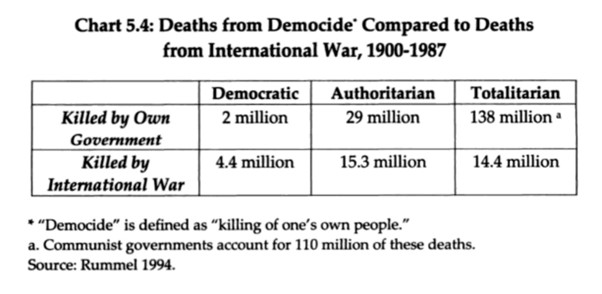Liberalism in Context
5 June 2023
Firstly, I would like to kick off this post with a thanks and thumbs up for the high quality thread which followed my last essay "A New Start - Liberalism as a guiding principle in South Africa".
At this critical juncture in South African history, it's easy and very tempting to point the fingers of blame in one direction only. But it's a mistake. Bad leaders (and yes! we have really bad leaders right now) partly arise out of bad history and a bad set of political cards.
If you can't (or prefer not to) jump the South African ship, the best bet is to support the only party with a proven track record of competent and honest governance. Every other consideration is secondary.
We all know which it is. Vote for it and support it.
In the meantime, we need to keep deepening and expanding our political insights because history goes on...until it doesn't.
The learning domain.
The practice of science, ideally, is governed by collective values, backed by formal institutions, which prioritise originality, the search for truth, intellectual integrity and mutual civility.
Given the fact that scientists are all too human it's remarkable how its founding culture, dating roughly back to the 16th century, has managed to withstand the buffetings of ego, ideological agendas, etc etc to deliver the remarkable goods which threaten to overwhelm us while liberating us.
However, when it comes to the political domain those ideas seems hopelessly and dangerously naive. The differences between science and the boundless, very noisy world of politics is intuitively obvious.
But despite the racket and emotions of the political scene indeed it can be, and has been, conceptualised as a learning collective in action.
While chance and unpredictability enters into the equation at all levels and timescales, humans, both individually and collectively, have the capacity to make what we can call 'educated guesses' and adapt accordingly. Clearly knowledge, expertise and motivation all play a role and some people seem to have a special gift. We want these as leaders.
But modern research also demonstrates that under a variety of conditions, collective networks and 'diversity' can beat individuals in reaching innovative solutions to complex problems. A great deal of research has gone into defining the optimum networks in terms of connectivity, the types and degrees of 'diversity' and the effects of 'noise'.
Another thing is to realise that in the process of adaptation, the 'fitness landscape' (some prefer to call it 'seascape') also changes.
So, to belabour the point somewhat, this means that the best (only?) adaptation on is ongoing and incremental. There is no one-off solution.
The motivational domain
Let's leave the adaptation/learning dimension for a moment and look at something else: human nature. The human evolutionary trajectory is unique in the sense we have specialised in being non-specialists.
Hence we come with different physical, emotional and cognitive repertoires which provides considerable reserve flexibility in responding to a whole variety of existential challenges.
A million years ago we were already a special ape and we have followed the trajectory set by Home erectus ever since. In so doing, culture rather than genes became the dominant mode of evolutionary adaptation.
That does not mean that genes became insignificant but rather that, first slowly and now very rapidly, culture has become the main driver of human adaptation and success or failure.
What has remained, however, as a constant is the universal biological problem: cooperation versus self-interest. Or the group versus the individual.
Humans are a social species par excellence but that dynamic tension is inherent in all human collectives, and will continue as such for the foreseeable future.
The political domain
In our long evolutionary experience as hunter-gatherers we adapted to punitively moralistic, highly egalitarian and generally cohesive small-bands. That was a necessity for survival in a high-threat environment.
Skill, courage, loyalty and altruism became highly prized and emulated. Cheats, slackers and self-aggrandisers were severely punished. Personal reputation as a team player was rewarded generously by group support and reproductive opportunities.
As some pre-technological societies became larger and, particularly following the development of agriculture 10--12 kya, the scale problem emerged. The close daily scrutiny possible in smaller groups became impossible as collectives became much larger.
The consequent enforcer deficit undermined the egalitarianism of HG bands and allowed elites to dominate larger and ultimately more complex. sub-specialised societies.
Following the agricultural revolution, the next 10 000 years have seen the emergence of different political systems in different geo-ecological regions.
Empires grew and collapsed in some regions. In others, collectives remained small and dispersed. Clan and caste systems were the norm elsewhere. Hierarchy, domination (including slavery) and corruption were widespread almost everywhere except persistent HG societies.
Religion was used as a means for ruling elites to cement their position and to mobilise support and social cohesion.
Of course, cultural norms which arose in one context could develop a life of their own under changed circumstances and unexpected consequences. And thus takes us to the next big leap of political philosophy: Liberalism.
Wikipedia has a conventional (but rather indigestible) summary of liberalism's modern roots as a political philosophy first in England and then the rest of Europe.
But my perspective is somewhat different: less a tracing of cultural spread, though that's undoubtedly important, but with a greater emphasis on the appearance of the WEIRD mind (Western educated, industrialised, rich and democratic) mind in Europe.
The WEIRD mind is analytic, individualistic, ambitious, rule-based (judgemental), reductive and broadly pro-social. The clan or tribal mind is hierarchical, tribal, kin and honour-based. The traditional Chinese (East Asian) mind is holistic, situation-orientated and non-judgemental.
Despite all this crude stereotyping WEIRD minds tend to be the outlier globally and, so far, the most successful.
This way of thinking originated in ground-breaking research into culture and cognition by Henrich and his collaborators, summarised in his magnum opus "The WEIRDest People in the World: How the West Became Psychologically Peculiar and Particularly Prosperous."
The basic thesis Henrich advances is that the Christian prohibition on kin marriage in the 5th and succeeding centuries ushered in a sequence of social changes which resulted in the WEIRD mind and the conquest of the Rest by the West.
Liberalism in its emphasis on personal freedoms and responsibilities, free enterprise, mutual tolerance and embrace of diversity, the impartial rule of law, democracy and the dignity of the individual is the political manifestation of the WEIRD mind.
The forms it assumes, whether libertarian, social democrat or egalitarian, etc, are determined by the specific context and history in which it is implemented.
Towards the end of the 20th century it appeared as though democratic liberalism was the "end of history" in the words of the political scientist, Francis Fukuyama. Liberalism had proven its moral and real world worth, leading the world in science, culture, technology, wealth, quality of life and the ability to project military power internationally.
The liberal democracies were the global magnet for both the most talented and disaffected populations of authoritarian states and banana republics everywhere. But tectonic plates were on the move both internally and externally.
BUT the same WEIRD, moralistic and restless minds which drove the great liberal explosion turned its moralistic energies inwards towards the sins of the West. An internal inquisition emerged and there was scant evidence that the more extreme proponents of the 'social justice' doctrine could ever regard the debt as repaid.
Faced with the prospect of limitless guilt and punishment in this world, many of their targets rebelled. The same freedom of speech and communication technologies which drove liberal supremacy now conspired to split the liberal world into two, mutually incomprehensible and hostile, camps.
At the same time, the rise of the technologically advanced and economically strong authoritarian Chinese model provided a pole around which a collection of other more hierarchical and authoritarian states could coalesce.
In rough terms, the world appears to be drifting towards a tripolar configuration of the West, the East and an amorphous Rest. This is not neat nor tidy nor stable but captures some of the trends which threaten global order.
They are the global tides on which South Africa is currently drifting. How this plays out over the relatively short-term future will be vitally important to our future. (To be continued)
Mike Berger
Some Notes and References
- From RANE/Stratfor- major USA Geopolitical Site - Podcast on SA Electricity Crisis https://worldview.stratfor.com/article/essential-geopolitics-anticipating-fallout-south-africas-electricity-crisis
- kya - a thousand years ago (5kya = 5000 ya). See also a mya, etc
- WEIRD - https://archive.ph/20210411191546/https://www.nationalreview.com/2020/09/book-review-the-weirdest-people-in-the-world-audacious-surprising/
- Eskom - https://www.dailymaverick.co.za/article/2023-06-01-george-fivazs-eskom-dirty-dossier-gets-clean-bill-of-health-in-expert-legal-opinion/?token=M…
- Governance - https://dailyfriend.co.za/2023/06/03/elections-of-consequence-a-crisis-of-governance-and-ideology/
- https://twitter.com/SteveStuWill/status/1665147319585738752/photo/


